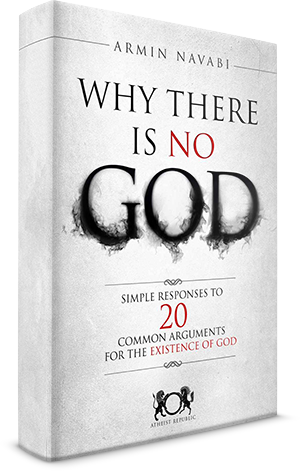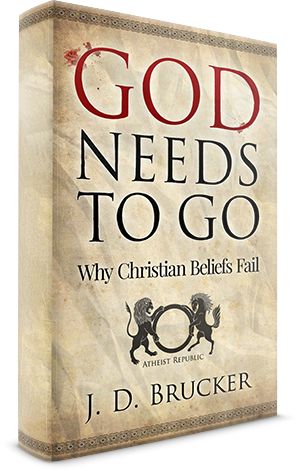Hi I am new to this community and although I don't consider myself an Atheist I enjoy learning more about Atheism.
Just curious, let's say someone has a mystical experience while meditating, or performing yoga, and the practitioner claims to have had an experience of
'God'. How does an atheist interpret this? Perhaps just neurological chemical alterations in the brain?
There are all sorts of Swamis and Yogis running around claiming Enlightenment and seeing God within all of creation, blissed out of their minds, transcending samsara and claiming to be One with the Universe. I am curious about the Atheists perspective on these kinds of claims, and their attitudes towards Zen Buddhism, Advaita Vedanta Yoga, as well as Mystics such as Rumi, Meister Eckhart, Abraham Heschel and even Alex Grey.
I'm curious in hearing any feedback whatsoever. Thanks.
Subscription Note:
Choosing to subscribe to this topic will automatically register you for email notifications for comments and updates on this thread.
Email notifications will be sent out daily by default unless specified otherwise on your account which you can edit by going to your userpage here and clicking on the subscriptions tab.





























Fist off Hi and welcome JahLive
I think Buddhism is one of the least offensive religions in the world. I practice meditation for various reasons myself, yoga too. its a kick-ass exercise! clearly you know more about it than I do though but I have been told bay numerous people Buddhism is much in line with my beliefs though I do not belong or wish to belong to any organized religion. I have spoke about my own outer-body experience elsewhere on this board but even after going through such a thing myself I don't necessarily believe in a God or know for sure that it was not all a hallucination of sorts.
Meditation and yoga is a self-enlightening experience. I think it has nothing to do with a god. When we meditate we explore our mind and it's subconscious. It can help us feel more relax and free from outer distractions. I love the feeling that meditation can give me.
thanks for your responses! I really enjoy meditation as well, I think everyone should try it...
I guess what I am having trouble with is how people define and conceptualize 'God'... There are mystics, and meditation masters within all religions that talk about experiencing God, and usually describe it as some kind of ego-less spiritual state of inherent emptiness, freedom, and peace where all are perceived to be expressions of the One, we are all the Beloved, we are all 'God'...
Rumi was a great a sufi muslim who expresses these experiences through beautiful poetry...
But obviously, there are religious people who do not think or act this way.
I really enjoy a quote from this Jewish philosopher Martin Buber:
"The atheist staring from his attic window is often nearer to God than the believer caught up in his own false image of God"
Just something to think about ;)
Never read any Martin Buber, but that is indeed and enjoyable quote! Have you ever and I am not suggesting it, but have you ever tried oxygen deprivation. besides hearing it's dangerous stuff I hear its in line with what I lot of people describe as their experience though not quite in line with mine from what I have read.
Meditation is an excellent practice, and has been clinically proven to have many health benefits, both physically and mentally. I've always believed in it, though I don't practice as much as I'd like. Still, I keep abreast of the findings coming out of my department and MIT (they get so hung up on details though) as theory of mind is an area of extreme interest for me, particularly the link between mind and body.
However, I do not equate the elated experience of being able to truly communicate with oneself as a whole as necessarily being linked to something greater, which people for some reason would assume would be a god of some sort. Personally (with no scientific backing whatsoever) I believe that the power of oneself is astounding, and there's no need to assume that something so awesome needs to come from an external source.
I would love to experience the so-called astral projection when meditating. I haven't experienced it yet. Do you know a technique to obtain that?
I've never tried oxygen deprivation, but I have had a so called 'mystical' experience while meditating, which is partially the reason I started this thread... I'm still not sure how to contextualize and understand what I experienced among the religious and scientific ideas that are out there.
I'm not an expert on astral projection either, but I have kept a dream journal for a number of years now, and it has helped me become more aware of my dream states, where astral-projection like things sometimes tend to happen... If you can train yourself to be more aware while sleeping, you will all of a sudden remember crazy dream experiences you would have otherwise forgotten. In Tibetan Buddhism, they have a method of doing this called 'Dream Yoga'. All sorts of books on Lucid Dreaming are out there too that can teach you how to trigger that type of experience.
My favorite mystic is Rumi (from 13th century), who claims to experience and know God... he has written countless poems but this one is in relation to meditation:
"silence is the language of god, all else is poor translation"
I don't think fundamentalist religious scripture types would enjoy the quote too much...haha
Just another idea to share ;)
Man you're just killing it with the great quotes. Love that one!
I love the idea of a dream journal, though I myself never had the wherewithal to keep one up.
Dreams do (in my mind irrefutably) potentially have valuable insight into things we have seen over the course of our day and their connection to things already stored in our memory - much of which did not have the salience to capture our attention and enter into our conscious thought. Let me bore you with some scientific anatomy :)
While you sleep (for more than 90 minutes), a beautiful thing happens in your brain. Information that has piled up in your waking hours, waiting to be processed, travels through the little jelly roll in your brain called the hippocampus, and is observed by an amazing section of this pipeline called the dentate gyrus. Together with your hippocampus and other mesolimbic (known to most as the lizard brain, which controls your basic drives and basically tells you what about what you saw is important to your basic needs and with the help of your frontal lobes more esoteric goals) regions, it goes through every detail and decides where every piece should go in the giant filing cabinet that is your cortex. Note that memories are not stored as the whole - there is no spot for your 8th birthday party, the memory of what the cake tasted like is in a completely different part than the memory of how many candles there were, and what color the balloons were, who attended, etc.
Dreams are basically an entertaining observation of this process. In the dream, the information you gained and the memories that information will create are all jumbled as they pass through the mossy fiber and Schaffer collateral pathways out to be filed in permanent storage. There is a region in the brain, most often called the Left brain interpreter (though it is not always in the left hemisphere - neuroscientists often come up with shizzle on the fly and then end up with arbitrary names that no longer serve to describe the truth) who's job it is to fill in the holes and create a narrative from the info that the senses provide, and it makes those fun dreams we know and love.
Still, while sleeping and watching this amazing reorganization, different details that we may have passed over the first time will catch your attention. Associations will be made based on information not consciously available to us, such as feedback from the cerebellum and medulla which control/are controlled by the body's nervous system (this includes sensing gravity, changes to our environment, and in some cases the autonomic states of other beings we feel emotionally or physically close to), and old memories that we have not accessed for a long time but are activated due to their proximity or relevance to the new information that we are putting away. These pre-existing bits may appear to be *new* information as it floats through the dentate gyrus. Many people believe that dreams can tell us things - but really, it's information that you already knew, but were not aware of. It's astounding how smart we are without even realizing it!
So yep, definitely pay attention to your dreams. I personally like sleeping with my head toward magnetic North, so that I can get the maximum amount of associative information from my environment, or with my head toward magnetic south if I feel I have a personal problem to sort through.
Wow, that's long :/ Sorry guys...
I like the idea of all of this, but the oxygen deprivation seems off to me. Of course you will see some sort of vision, it's the result of your brain shutting down certain portions that normally go unused so the rest of it can work more efficiently to keep you alive.
I agree that oxygen deprivation alone is not really what's going on here. It does contribute strongly to the characteristic traits of most near-death experiences, however... seriously.
I like the idea of all of this, but the oxygen deprivation seems off to me. Of course you will see some sort of vision, it's the result of your brain shutting down certain portions that normally go unused so the rest of it can work more efficiently to keep you alive.
In a Biblical sense meditation means intense concentration in study. God simply means anyone or anything venerated or mighty. The God above, or before all other Gods is Jehovah. Jesus was a god, Satan is a god, Moses was appointed to be a god to Aaron and Pharaoh, meaning simply, mighty. The apostle Paul used spiritism, translated from the Greek pharmakia, from which the English word pharmacy comes. The primitive peoples, even today, use drugs to gain access to the spirit world and spirit creatures. Demons. So Christians are warned against methods which would leave them open to the influence of these potentially harmful spirits. Through mind and mood altering drugs, hypnotism, spirit mediums, and things like this.
Good point Pathway. Especially in Judaism, meditation is centered on scripture itself, and I particularly like Kabbalah which uses contemplation, meditation and visualization on the letters of the Hebrew language itself as an outlet or conduit allowing one to access the Divine, so they say. Monks and Ascetics seem to do a lot of meditative rituals and prayers as well, so I guess I'm just thinking out loud here that meditative practices are also prevalent in Western religions too...
Indeed they are, monasteries are a great place to meditate I was originally turned on to the idea when I heard a person i knew to be an atheist would go and meditate at monasteries. I was like but you don't believe in a god, they said this is true but its a nice quite sanctuary and it helps you to focus on your goal better for however long you need it. It is true that western religions practice meditation as well.
I think meditation isgreat and Yoga seems to be the popular way to learn to do it. I prefer to meditate by simply being alone. I can be standing, sittin or laying in bed, as long as I'm alone I can meditate properly. If someone is around they distract me even if we dont talk.
Yeah I know what you mean, the presence of others make it quite hard for me not to be distracted.
We should meditate on quite and private places. Some monks even chose forest and mountains just to meditate or yoga. Some preferred beaches because the calming sound of waves make us feel more relax and peaceful.
I agree, I can't even work in a loud, bustling environment, trying to meditate in a room full of people would be difficult for me even though they are trying to do the same thing as me. You will always have those two chatty ones just like in church who use that time to "catch up" rather than for what it was originally intended.
I'm new here, but follow this site on FB.
My own journey towards enlightenment began about 13 years ago and ended one day walking up to my job. I'm a huge fan of Alan Watts, Krishnamurti, Wei Wu Wei, as well as those listed above in JahLive's post. Here's what my experience was/is:
There is no such thing as enlightenment (or enlightened vs un-enlightened behavior). According to the teachings of the Vedas, Upanishads, Advaita, Buddhism/Zen, you are already that (which is your true nature). Most westerners confuse the word god with the Christian version. Eastern teachings use words like Absolute, Tao, Void, Spirit, etc. The key is to remember that these words are merely pointers, like the words on the menu pointing to the actual food you're about to eat.
If the pointers allude to the fact that I am truly made of the stuff of the universe (to put a modern take on it) then, yes, I am the awesomeness that has manifested as a human. Not the god that has a beard and, mysteriously looks like the ethnic pool you got dropped into and will send you to hell for not believing that he sacrificed himself to himself (etc, etc).
We confuse words like bliss, happiness, oneness with egotistical desires for how we want things to be. Sadly, this paves the way for charlatans to sell us paths to waking up. We're sold beads, robes, weekend retreats (ever notice that these are always in some vacation setting?), and anything else to get us "closer to oneness". How could we possibly be any closer to "this"?
I hope this helps. ;)
Oh...meditation is when you sit down, shut your face, and listen.
I forget where I was reading it, but from the reports of the "peace" given by mediation... it's not so much bliss as just tranquility, and not so much positive as just neutral. I think some people get their hopes way up.
I'll just add this link here. My view of meditation or mindfulness is pretty much as the horseman describes it.
http://www.samharris.org/blog/item/how-to-meditate
I actually know the woman who heads this research in my insitution. Mindfulness meditations have many real, tangible benefits/
http://archive.wusa9.com/news/article/206855/0/Mindfulness-Meditation-Is...
Kumar,
Good post. Counting from 1-10 while focusing on the breath is extremely challenging (it was for me, at least).
It's just an exercise. That is all it is. All the enlightenment Deepak Chopra stuff is useless.
As for how harmless Buddhism is..lol. Look up all the Buddhist monks that burned themselves alive in order to protest something. (Because the of course knew they'd be reincarnated)